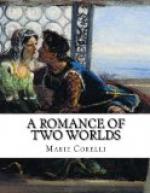“O Music!” he wrote, “Music, thou Sweetest Spirit of all that serve God, what have I done that thou shouldst so often visit me? It is not well, O thou Lofty and Divine One, that thou shouldst stoop so low as to console him who is the unworthiest of all thy servants. For I am too feeble to tell the world how soft is the sound of thy rustling pinions, how tender is the sighing breath of thy lips, how beyond all things glorious is the vibration of thy lightest whisper! Remain aloft, thou Choicest Essence of the Creator’s Voice, remain in that pure and cloudless ether, where alone thou art fitted to dwell. My touch must desecrate thee, my voice affright thee. Suffice it to thy servant, O Beloved, to dream of thee and die!”
Meeting Cellini’s glance as I finished reading these lines, I asked:
“Did you know the author of this book, signor?”
“I knew him well,” he replied; “he was one of the gentlest souls that ever dwelt in human clay. As ethereal in his music as John Keats in his poetry, he was one of those creatures born of dreams and rapture that rarely visit this planet. Happy fellow! What a death was his!”
“How did he die?” I inquired.
“He was playing the organ in one of the great churches of Rome on the day of the Feast of the Virgin. A choir of finely trained voices sang to his accompaniment his own glorious setting of the “Regina Coeli.” The music was wonderful, startling, triumphant—ever rising in power and majesty to a magnificent finale, when suddenly a slight crash was heard; the organ ceased abruptly, the singers broke off. The musician was dead. He had fallen forward on the keys of the instrument, and when they raised him, his face was fairer than the face of any sculptured angel, so serene was its expression, so rapt was its smile. No one could tell exactly the cause of his death—he had always been remarkably strong and healthy. Everyone said it was heart-disease—it is the usual reason assigned by medical savants for these sudden departures out of the world. His loss was regretted by all, save myself and one other who loved him. We rejoiced, and still do rejoice, at his release.”
I speculated vaguely on the meaning of these last words, but I felt disinclined to ask any more questions, and Cellini, probably seeing this, worked on at his sketch without further converse. My eyes were growing heavy, and the printed words in the “Dead Musician’s Letters” danced before my sight like active little black demons with thin waving arms and legs. A curious yet not unpleasant drowsiness stole over me, in which I heard the humming of the bees at the open window, the singing of the birds, and the voices of people in the hotel gardens, all united in one continuous murmur that seemed a long way off. I saw the sunshine and the shadow—I saw the majestic Leo stretched full length near the easel, and the slight supple form of Raffaello Cellini standing out in bold outline against the light; yet




